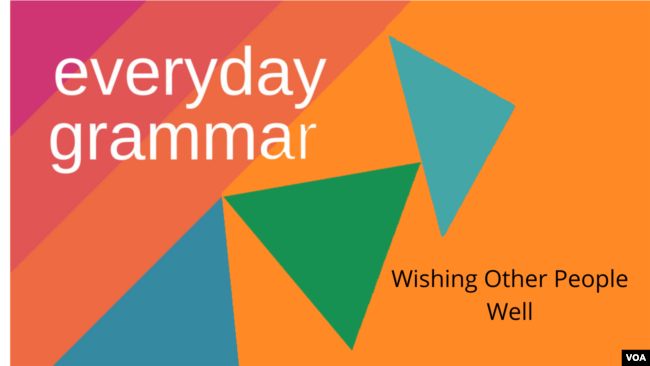"Good luck" " I wish you good luck.”と言われたら?
シンプルに ”Thank you."
または、”Thank you! I think I can do it.” とか、”Thank you! I'm sure I can handle this.” とこなれた返事も!!
Wish me luck.(幸運を祈ってね)と相手に言う言い方も覚えておきましょう。
例えばWish me luck getting a job.(就職活動の幸運を祈ってね)
そして、”Wish me luck.”と言われたら”Good luck.”と返しましょう。
いろいろ集めてジャンジャン使いましょう♬
VOAで英語を学びましょう!!
他人の幸福を祈る方法(和訳)
How to Wish Other People Well
September 22, 2022
あなたが友人と話していると想像してください。あなたの友人は、もうすぐ大きなテストや就職の面接を控えていると言います。
これは、彼らの幸運を祈るのに良い機会です。
でも、あなたはどのようにしますか?
今日のEveryday Grammarでは、文法と社会的な状況を結びつけるポイントを探っていきます。相手の成功を祈るための丁寧でフレンドリーな表現について学びます。
断片的な文と完全な文
社会生活では、他人の幸せを願う機会が多くあります。そのような願いは、文の断片や完全な文の形で表現されます。
断片とは、主語や述語の一部が欠けた不完全な文のことです。一般に、他人の幸福を祈る断片には、主語が欠けています。
例えば、誰かの成功を願うときに使われる“good luck,” というフレーズを考えてみましょう。"Good luck" は、形容詞の "good" と名詞の "luck" です。
しかし、このフレーズはさらに何かを示唆しています。それは、次のようなことです:"I wish you good luck."(幸運を祈ります)
いずれにせよ、英語圏の人は "Good luck" というフレーズだけを使うことが多いようです。
ですから、 "Good luck with the job interview!" といえますね。
完全な文章にする場合、英語話者はしばしば "wish" や "hope" といった動詞を使います。
例えば、こう言えますね。
“I hope the job interview goes well tomorrow.”
Or
“I wish you the best of luck with your job interview tomorrow.”
明日の面接がうまくいくことを祈っています。
英語圏の人々は、完全な文章を使って、相手を信じる表現である肯定文を作ることもあります。このような信念の表現も、他人への優しさや温かさを示す方法の一つです。
例えば、ある人はこう言うかもしれません。
"I know you are worried about the test tomorrow, but I also know you are up for the challenge!”
明日のテストが心配なのは分かるけど、あなたが挑戦するのも分かるわ。
Or
“The job interview will be easy. You’re going to do great!”
就職の面接は簡単だよ。あなたならきっとうまくいくわ!
アクティビティ
これらのアイデアについて、少し時間をかけて考えてみましょう。この3つの単語を使って、誰かの成功を祈る文を作ってみましょう。
Luck test next week
答えを考えている間、音声を一時停止してください。
以下は、考えられる答えの一つです:
“Good luck with the test next week!”
来週のテスト、頑張ってね!
では、友人が次のように言ったと想像してください:
“I’m so worried about tomorrow - I have a difficult math test!”
明日心配だわ-数学の難しいテストがあるの!
あなたはその友達に何と言うべきでしょうか?音声を一時停止して、答えを考えてみてください。
以下は、考えられる答えの一つです:
"I hope the test goes well tomorrow!"
明日のテストがうまくいくといいね!
以下は、肯定を含む他の2つの可能な答えです:
"I know you are worried about the test, but I also know that you will do
great!"
テストが心配なのは分かるわ、でも、きっとうまくいくと思うよ。
"The test will be easy for you.
あなたならきっとうまくいくわ!
締めくくり
今日のレポートでは、他の人の成功を祈るためのいくつかの方法について探りました。もちろん、他にもいろいろな方法があります。
今度、英語を話す人の話を聞くときは、彼らがどのようにお互いの幸福を祈っているのかに注意しましょう。彼らがどのような単語やフレーズを使うのか、注意深くメモしておきましょう。その際、断片的な文章なのか、完全な文章なのか、自問自答してみましょうね。
このレポートは、リスナーの皆さんへのお祈りで締めくくります。
Good luck with your English studies. We wish you continued success on the path of language learning.
・・・(でも、これってhopeじゃなないのかな?)独り言
How to Wish Other People Well
Imagine you are talking with a friend. Your friend tells you that they have a big test or job interview coming up soon.
This is a good time to wish them well.
But how do you do so?
In today’s Everyday Grammar, we will explore a point of connection between grammar and social situations. You will learn about polite, friendly ways to wish other people well.
Fragments and complete sentences
Social situations provide us with many opportunities to wish other people well. Such wishes can come in the form of sentence fragments or complete sentences.
A fragment is a kind of incomplete sentence – it is missing part of the subject or predicate. In general, fragments that wish other people well are missing the subject.
Consider, for example, the phrase “good luck,” which is used to say that you hope someone will succeed. “Good luck” has an adjective, “good,” and a noun, “luck.”
But the phrase suggests something more. It suggests something like this: “I wish you good luck.“
In any case, English speakers often just use the phrase, “good luck.”
So, a person might say, “Good luck with the job interview!”
In terms of complete sentences, English speakers often use verbs such as “wish” or “hope.”
For example, a person might say,
“I hope the job interview goes well tomorrow.”
Or
“I wish you the best of luck with your job interview tomorrow.”
English speakers also use complete sentences to make affirmations - expressions of belief in the other person. Such expressions of belief are another way to show kindness or warmth to other people.
For example, a person might say,
"I know you are worried about the test tomorrow, but I also know you are up for the challenge!”
Or
“The job interview will be easy. You’re going to do great!”
Activity
Let’s take some time to work with these ideas. Take these three words and form a statement that wishes someone well.
Luck test next week
Pause the audio while you are considering your answer.
Here is one possible answer:
“Good luck with the test next week!”
Now imagine that a friend tells you the following:
“I’m so worried about tomorrow - I have a difficult math test!”
What should you say to your friend? Pause the audio to consider your answer.
Here is one possible answer:
“I hope the test goes well tomorrow!”
Here are two other possible answers that involve affirmations:
“I know you are worried about the test, but I also know that you will do great!”
“The test will be easy for you. I know you will do great!”
Closing thoughts
Today’s report explored a few ways to wish others well. There are, of course, many other ways to do so.
The next time you are listening to English speakers, pay careful attention to how they wish each other well. Make careful note of the kinds of words and phrases that they use. Ask yourself if they are using fragments or complete sentences.
We will close this report with some wishes for our listeners.
Good luck with your English studies. We wish you continued success on the path of language learning.
Words in The Story
interview – n. a formal meeting with someone who is being considered for a job or other position
predicate – n. grammar: the part of a sentence that expresses what is said about the subject
challenge—n. a difficult task or problem
